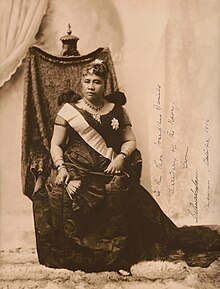Women in Hawaii
Women in Hawai'i reside in the Hawaiian Island and are citizens of the United States.[1] Immigrants and Native Hawaiians make up the population of women in Hawai'i. Native Hawaiian women descended from Polynesians.[2] Immigrants women came from many countries that created a cultural exchange in the island.[2]
History
[edit]Notable Women
[edit]Queen Ka'ahumanu
[edit]
Queen Ka'ahumanu was born between 1768 and 1777. After King Kamehameha I died, Queen Ka'ahumanu enacted reforms like letting women eat with men and letting women eating certain foods that use to be prohibited. Queen Ka'ahumanu accepted the Christian faith from missionaries mid-1820s. She emphasized the importance of literature to the people in order for them to read the Christian Bible. Because of her faith, she created a new legal system. The new legal system was based on the Christian Ten Commandments.[3]
Queen Lili'uokalani
[edit]
Queen Lili'uokalani was born in September 2, 1838. She was a passionate music composer, or a haku mele. She became a queen in 1891 and worked against the U.S. annexation of Hawai'i. Additionally, she created the Hawai'i 1892 Highways Act. She advocated highly for Hawaiian sovereignty. In a revolt, the provisional government put her under house arrest. The provisional government also made her give up the throne. As she lay in house arrest, she created songs. A song titled "Aloha 'Oe'" was able to be smuggled out while she was in house arrest. This song became popular so it was recognized as the national song.[4]
Dr. Isabella Aiona Abbott
[edit]
Dr. Isabella Aiona Abbott was born on June 20, 1919. In her childhood, she would collect seaweed to use for cooking. The interest in seaweed continued through her adulthood.[5] In 1950, she earned her doctorate at the University of California, Berkeley in botany. This made her the first Native Hawaiian women to earn a Ph.D. in science.[6] She helped discover more than 200 species of seaweed. Additionally, she brought more knowledge on the benefits of plants in marine ecosystems.[7]
| Part of a series on |
| Women in society |
|---|
 |
See also
[edit]- Liliuokalani
- Women in the Hawaii Territorial Legislature
- Women's suffrage in Hawaii
- Women in Guam
- Women in Puerto Rico
References
[edit]- ^ "8 U.S. Code § 1405 - Persons born in Hawaii". LII / Legal Information Institute. Retrieved 2022-03-17.
- ^ a b Kingdom, Hawaiian (2016-02-26). "Natives of the Hawaiian Islands are not Indigenous People, They're Aboriginal". Hawaiian Kingdom Blog. Retrieved 2022-03-17.
- ^ "Queen Ka'ahumanu (U.S. National Park Service)". www.nps.gov. Retrieved 2022-03-17.
- ^ "Queen Lili'uokalani (U.S. National Park Service)". www.nps.gov. Retrieved 2022-03-17.
- ^ Nogelmeier, Puakea (2011-09-30), "Reflection: Isabella Kauakea Yau Yung Aiona Abbott", I Ulu I Ke Kumu, University of Hawai'i Press, pp. 80–84, retrieved 2022-03-17
- ^ Ethogram, The (2021-06-29). "Science Heroes: Dr. Isabella Aiona Abbott". Retrieved 2022-03-17.
- ^ Parks, Shoshi (2022-03-11). "How the 'First Lady of Seaweed' Changed Science". Atlas Obscura. Retrieved 2022-03-17.
